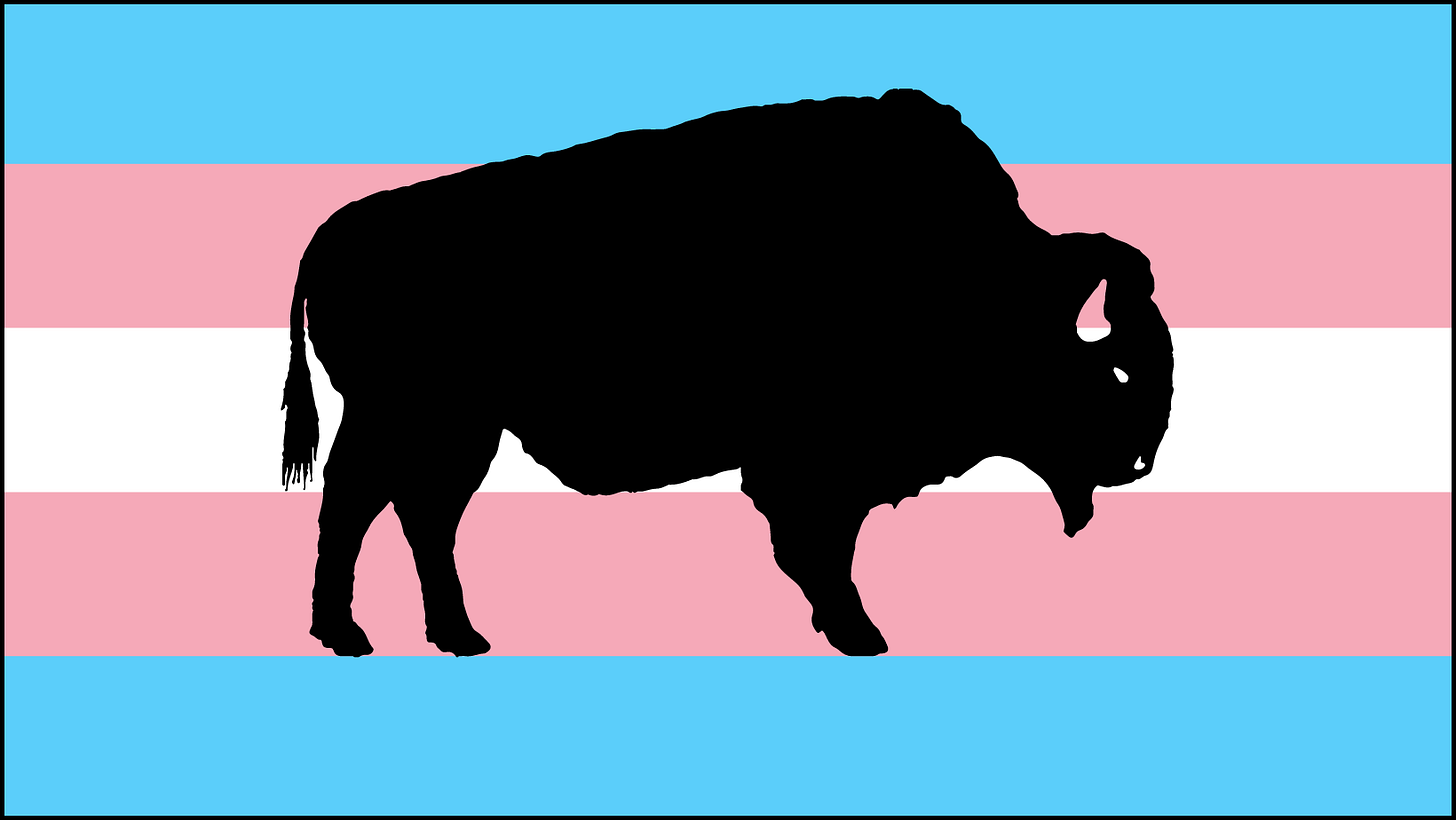The smallest of words underpin the fight for trans acceptance, even in federal court
Recent high-profile lawsuits have seen lawyers disagree about pronouns. Is misgendering a trans person ‘zealous advocacy’ or simple incivility? A legal scholar weighs in.
Two recent lawsuits filed in the U.S. District Court of Wyoming waded into the national discourse surrounding transgender rights. One put forward a question about freedom of speech. The other challenged a transgender student’s acceptance into female spaces.
The lawsuits pit free speech proponents against anti-harassment policies and champions of transgender rights against their opponents. But the struggle goes even deeper than the legal arguments — to the very word choice employed by lawyers on opposing sides of the struggle.
A national debate about pronouns — their use, their misuse and their meaning — has come to Wyoming’s federal district court.
Pronouns: little words with a big impact
From schools to video games, pronouns have earned a place in the national discourse. These tiny parts of speech — specifically ‘he,’ ‘she,’ ‘they’ and their variants — have come to symbolize the ongoing fight for LGBTQ+ acceptance.
Transgender and nonbinary people are growing more visible in American society, and about five percent of young adults in the U.S. say their gender is different from their sex assigned at birth.
Coming out as transgender or nonbinary often involves identifying with new pronouns and asking others to use them. An individual assigned male at the time of their birth might have been called “he” their entire life, but feel more comfortable now going by the singular “they” or even “she” — whichever corresponds more closely to their gender identity.
This has inspired pushback from people who believe one’s pronouns are immutable. But much of the professional world has evolved to accept and support the individual freedom to determine one’s own pronouns.
NPR has published guidelines saying, “Proper use of gender identity terms, including pronouns, is a crucial way to signal courtesy and acceptance,” while other journalistic style guides like the Associated Press argue much the same. Psychiatric professionals are also expected to respect patients’ pronouns and other gender identity terms.
The opposite of respecting someone’s pronouns is calling them by pronouns other than those they identify with, a practice known as “misgendering.”
It’s considered a social faux pas when it's done accidentally — transgender rights groups suggest you “simply apologize and move on” if you make a mistake — but it’s considered rude when done on purpose.
So what about when it's done in legal filings?
That’s not just an academic question; both of the lawsuits referenced above intentionally and consistently misgender a trans UW student.
One Cornell Law School scholar, Assistant Professor Chan Tov McNamarah, has argued that this intentional lawyerly misgendering ought to be banned by the professional rules of conduct that dictate how attorneys must behave. McNamarah argues that misgendering is simply disrespectful, and that it presents an additional and unnecessary burden for individuals who want to — or have to — engage with the legal system.
“Gender cuts to the heart of who a person is,” they said. “To misapply gendered labels, gendered titles, gender honorifics in this way, we're essentially removing the autonomy from someone to assert who they are.”
Two federal lawsuits in Wyoming wade into the discourse
Artemis Langford, a transgender UW student and member of the Kappa Kappa Gamma (KKG) sorority, has been misgendered repeatedly in the courts for more than half a year.
In one lawsuit, a Christian preacher sued the University of Wyoming, claiming the institution infringed on his First Amendment right to free speech. He displayed an anti-trans banner in the student union back in December, using Artemis Langford’s full name to make his point and calling her a male.
The preacher was banned from tabling in the union for one year and he sued the university for the right to return. He was granted a preliminary injunction, allowing his return this fall semester, and the university has signaled it will likely drop its defense.

Neither the preacher nor his lawyers would comment for this story, but the preacher’s initial complaint, like his banner, misgenders Langford consistently, calling her a “biological male” — a term medical professionals avoid, but which is commonly used by those making anti-trans arguments or introducing anti-trans laws. The widely accepted alternate term is “assigned male at birth,” which is more neutral — although even here there is fierce partisan disagreement. One right-wing media leader in Wyoming has even labeled the term “Orwellian.”
The complaint also argues that she “appeared as a male, not as a female,” and mentioned her alleged height and weight as examples of her failure to be feminine.
The preacher’s case is not the only federal lawsuit before the U.S. District Court of Wyoming to misgender Langford this year.
Separately, six members of Kappa Kappa Gamma brought a lawsuit to remove Langford from the sorority and prohibit the organization from recruiting or inducting other transgender students.
This lawsuit also references Langford’s height, weight and appearance and labels her a “biological male.”
“What they're accusing my client of doing is engaging in this elaborate hoax to pretend to be female just in order to be around other women,” said Langford’s lawyer, Rachel Berkness. “So I am not sure if it is necessarily an effort to just denigrate her as a transgender woman, or whether it's an effort to paint her as somebody posing as a transgender person — both of which are horrible allegations to have against my client, which in the broader context don't make a lot of sense.”
Attorneys for the sorority plaintiffs would not comment for this story, nor would attorneys for Kappa Kappa Gamma. But the various court filings from each demonstrate their differing views. While the plaintiffs consistently used he/him, the sorority consistently used she/her — both referring to the same individual.
Berkness said it’s frustrating to see the opposing counsel misgender her client.
“My client is also legally female,” she said. “That's never been mentioned in the complaint … She is legally female, but they are using male pronouns to describe her regardless.”
Berkness, as well as attorneys for the sorority itself, have characterized the lawsuit as a press release in disguise, meant for an audience other than the court, with aims other than a legal win.
“Not only does it appear to be a press release, but it's clickbait,” Berkness said.
The defendants have pointed to the plaintiffs’ legal fund kickstarter, which has raised more than $60,000, and their multiple appearances on national media, where Langford’s appearance was again mocked.
“You can put lipstick on a pig, that doesn’t make it a lady,” Cassie Craven, the plaintiffs’ attorney, said during an appearance on The Megyn Kelly Show.
The misgendering thrown Langford’s way in legal filings was just one aspect of this wider environment the student has found herself in during these past many months, Berkness said. But it’s emblematic of the treatment she’s received both within and outside of the legal system.
"I would hope that Ms. Langford wouldn’t be dragged through something like this again," Berkness said.
Ultimately, U.S. District Court Judge Alan B. Johnson dismissed the sorority lawsuit, warning the plaintiffs that, if they plan to refile, they should not “copy and paste” from this lawsuit, which the judge said included “irrelevant” and “unsubstantiated” allegations unconnected to their central argument.
In the final decision, Johnson wrote, “the Court will not define ‘woman’ today.” Despite this, Johnson consistently refers to Langford as a woman and uses she/her pronouns, even in his recitation of the underlying facts.
“Embittered by their chapter's admission of Artemis Langford, a transgender woman, six Kappa Kappa Gamma sisters at the University of Wyoming sue their national sorority and its president,” Johnson wrote.
Berkness said this language shows that even those officially staying neutral can adopt respectful language.
But what about when parties are not neutral?
The Christian preacher in his case, the plaintiffs in the sorority case, and their supporters in Wyoming and throughout the country who elevated them — in one way or another — argue that Langford is not a woman. The sorority case asks, “whether Langford is a Kappa Kappa Gamma sister?” according to the judge. It hinges in part on Langford’s inclusion in or exclusion from the broad concept of womanhood.
When that is the argument between trans allies and adversaries, even word choice can be a point of disagreement.
Those who oppose a transgender woman’s inclusion in female spaces could argue that using she/her pronouns undermines the larger points they’re trying to make. In those instances, wouldn’t using she/her pronouns amount to a concession on the part of the plaintiffs. Perhaps a concession that undermines their central argument?
‘Calculated, rather than careless’
“Absolutely not,” said the Cornell Law School scholar, Assistant Professor Chan Tov McNamarah, who penned a UCLA Law Review article about the topic in 2020.
“Lawyers must regularly toe the line between zealous advocacy and incivility,” they wrote. “Quite often the division is a hazy one.”
McNamarah believes misgendering sits at this intersection of “strategy and discourtesy.”
“In recent litigation involving the civil rights of transgender persons, advocates of anti-trans positions have incorporated these misidentifications into their legal filings,” they wrote. “This development should give pause, and too, raise concern. Unlike a slip of the tongue at oral argument, the intentionality inherent in writing indicates this is calculated, rather than careless.”
Using the proper pronouns could be seen as undermining a plaintiff’s case — if that plaintiff’s case is that someone else, such as Langford, does not belong in female spaces, does not belong under the umbrella of womanhood, and therefore does not deserve the pronouns she claims.
But McNamarah argued this is no excuse.
“This is an argument that's made quite a bit, actually, but it doesn't hold water when we look at it,” they said. “So there are quite a few courts, quite a few opinions — I believe it's in the hundreds at this point — where courts have referred to gender minority parties with the pronouns that are appropriate, and explicitly state that they're doing so out of respect, not because they're making a legal determination of gender whatsoever.”
McNamarah said there are even Supreme Court cases where “trans-antagonistic” parties have referred to other parties by the proper pronouns, while clarifying in a footnote that their use of preferred pronouns is not meant as anything other than a sign of respect. (They give examples of various briefs filed in three specific Supreme Court cases in their 2020 article, some of which engage in misgendering. But others, even those taking anti-trans positions, use a party’s preferred pronouns.)
“When we're using the words out of respect, it doesn't necessarily mean that we are agreeing to anything other than respecting an individual,” McNamarah said. “So when we refer to a judge as ‘Your Honor,’ we're not expressing anything distinct about the judge’s honorability. So now to pick it apart and to say, ‘Pronouns absolutely have to mean some larger message,’ is quite frankly, just ridiculous.”
McNamarah argued the impulse to misgender another party in court filings is simply the latest iteration of a long historical struggle in America’s legal system. Enslaved people were “unnamed.” Emancipated people and their descendants were addressed by generic names or as “boy” by both lawyers and judges.
“The symbolism, the expressive dimension of that practice, was to show that African Americans were so demeaned that they could be addressed in any way, shape, or form and they'd have to respond,” McNamarah said.
Likewise, women have fought against being called “honey” or “sweetie.” In the 1970s, they fought for honorifics such as “Ms.” that — unlike “Mrs.” or “Miss” — did not reference their relationship to men. McNamarah argued that Black people, women, and now members of the LGBTQ+ community have faced an additional burden when interacting with the courts — one of basic recognition — that white people, men and cisgender individuals have not. This disadvantages members of these minority groups before supposedly neutral courts of law.
“I think that the issue we're seeing now with misgendering is just a modern replication of the practices that we've seen thus far,” McNamarah said. “It should not be that the cost of participating in the legal system for gender minorities is a risk of harassment. That shouldn't be a cost for anyone.”

Bar associations, bias and prejudice
McNamarah has argued that bar associations are the proper venue for cracking down on misgendering in legal filings. In every state, bar associations license lawyers and outline the rules of professional conduct that lawyers in that state must follow. When lawyers violate those rules, they can be “disbarred” and prohibited from practicing law for a period of time.
The Wyoming Bar Association has no rule explicitly banning the practice of misgendering in legal filings. To add such a rule, the Office of Bar Counsel would propose an amendment for consideration. There would be a 30-day comment period during which practicing lawyers in Wyoming would have the chance to offer feedback or edits. That feedback could then be worked into a subsequent draft of the amendment. Ultimately, the Wyoming Supreme Court would get to decide whether to add the amendment to the rules of professional conduct.
“The Court is the only body that can approve and adopt the proposed amendments,” said Wyoming Bar Association Executive Director Sharon Wilkinson. “The Court could also make further changes as it deems appropriate.”
But so far, no one has raised the specific issue of misgendering, Wilkinson said. “There has been no discussion about this in Wyoming that I am aware of.”
But Berkness, Langford’s lawyer, said she believes the rules that do exist imply a ban on misgendering.
The rules currently state that a lawyer who “knowingly manifests by words or conduct, bias or prejudice based upon race, sex, religion, national origin, disability, age, sexual orientation or socioeconomic status, violates [the rules of professional conduct] when such actions are prejudicial to the administration of justice.”
But those rules include the caveat that: “Legitimate advocacy respecting the foregoing factors does not violate [the rules].”
Without further guidance, this lands the issue back at the intersection of “strategy and discourtesy” McNamarah referenced in their original article.
But rules of professional conduct are not radically different between states, so a ruling from Illinois — involving language from that state’s rules identical to Wyoming’s — might shed light on the issue.
A federal court ruled last year that the Illinois Bar Association’s ban on “bias or prejudice based upon sex” encompasses a ban on bias or prejudice based upon gender identity. This follows a U.S. Supreme Court case from 2020 that found discriminating against gay and transgender Americans was de facto discrimination based on sex.
“That ruling by the United States Supreme Court — when read in connection with our Wyoming Rules of Professional Conduct that prohibits a bias or prejudice based upon race, sex, religion — would also prohibit a bias or prejudice based upon being homosexual or transgender,” Berkness said.
But that’s a legal argument that has not yet been explicitly raised in Wyoming-based court filings.
Wyoming lawyers are, at the moment, free to use whatever pronouns they want for the parties they discuss in their filings. While the court itself has referred to Langford as a woman, or with she/her pronouns, it has stopped short of explicitly scolding the lawyers who haven’t.
The state bar association’s rules of professional conduct might ban misgendering by way of the argument levied by McNamarah and Berkness, but there is no explicit rule or court decision saying as much.
“Pronouns, honorifics, and other such gendered modes of address, are quickly becoming the latest flashpoint in the movement towards social equality for transgender Americans,” McNamarah writes. “To fail to address lawyers’ misgendering is to ignore blatantly unprofessional behavior, and worse, gives the appearance of countenancing and encouraging transphobia within the legal system … By recasting misgendering as attorney misconduct, state bar associations can begin the necessary work of addressing the wanton disrespect of gender minorities by members of the profession.”





